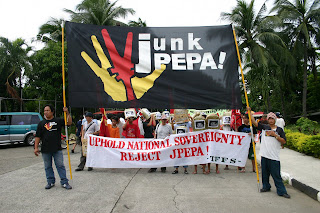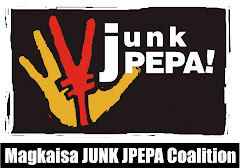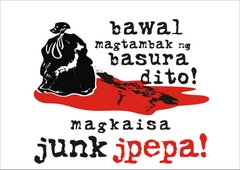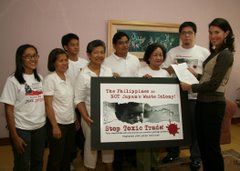
20 September 2007,
MJJC advocates picketed the Senate wearing bayongs over their head, in a direct reference to graphic images of the 2nd World War wherein Filipinos who collaborated with the Japanese covered their heads to conceal their identities, as they sentenced their fellow compatriots to death at the hands of the Japanese imperial army. The Coalition said that DTI Undersecretary and chief JPEPA negotiator Tomas G. Aquino, DTI Secretary Peter Favila, and Philippine Ambassador to Japan Domingo Siason were the “New Makapili”, willing accomplices to the demise of Philippine industry and the death of the livelihoods and jobs of thousands of Filipino workers, farmers, and fisherfolk at the hands of Japanese government and corporate interests.
Photo by Marnie Dolera/GAIA-EcoWaste Coalition.
 The Coalition questioned the conflicting economic projections and figures presented by the government panel, pointing out that the studies conducted by the Philippine Institute for Development Studies (PIDS) had been conducted years before the start of the actual JPEPA negotiations, and in all likelihood did not correspond with the final outcome of the negotiations. The Coalition called for objective, realistic, coherent economic assessments based on the concessions given and the final text of the treaty. They cautioned that any studies conducted on any other basis would be sheer speculation and should be disregarded by the Senate as immaterial and irrelevant to the proceedings.
The Coalition questioned the conflicting economic projections and figures presented by the government panel, pointing out that the studies conducted by the Philippine Institute for Development Studies (PIDS) had been conducted years before the start of the actual JPEPA negotiations, and in all likelihood did not correspond with the final outcome of the negotiations. The Coalition called for objective, realistic, coherent economic assessments based on the concessions given and the final text of the treaty. They cautioned that any studies conducted on any other basis would be sheer speculation and should be disregarded by the Senate as immaterial and irrelevant to the proceedings.
The Coalition also questioned the entire concept of trickle-down economics which is at the heart of the JPEPA. As stated by the PIDS in various fora, the main beneficiaries of the JPEPA will be export-oriented industries, agri-business ventures dealing in high-value or so-called “cash crops”, selected service providers, and the retirement industry. The Coalition pointed out that it was highly unlikely that these limited sectors could be responsible for the projected “dynamic growth” under JPEPA, and chided the government for not involving the rest of the population in economic activity and economic growth.
The Coalition also pointed out that given the premise of trickle-down economics, it would be highly unlikely that any significant poverty alleviation would take place under the JPEPA. Contrary to the government’s assertion that any kind of growth would contribute to poverty alleviation, the Coalition pointed out World Bank, UNDP, and ADB studies that show that growth that increases the gap between rich and poor can actually worsen poverty. JPEPA will tend to increase the divide between the have’s and the have-not’s.
“If the Philippine Senate decides to approve the JPEPA despite the overwhelming evidence that this treaty will be disastrous to the Philippine economy, this will be nothing less than economic hara-kiri,” said Atty. Golda Benjamin, lead counsel for the Coalition.
Photo by Marnie Dolera/GAIA-EcoWaste Coalition.

For all its pretenses at being an “economic partnership” agreement, the JPEPA is really a partnership between unequals, and a repressive agreement that sacrifices the long-term economic development, and ultimately the dignity and sovereignty of the Filipino people. It is nothing less than economic treason. We must label it for what it truly is, and those responsible for such a reprehensible agreement must be made to answer to the Filipino people.
More pictures:
Photos by Marnie Dolera/GAIA-EcoWaste Coalition.








No comments:
Post a Comment